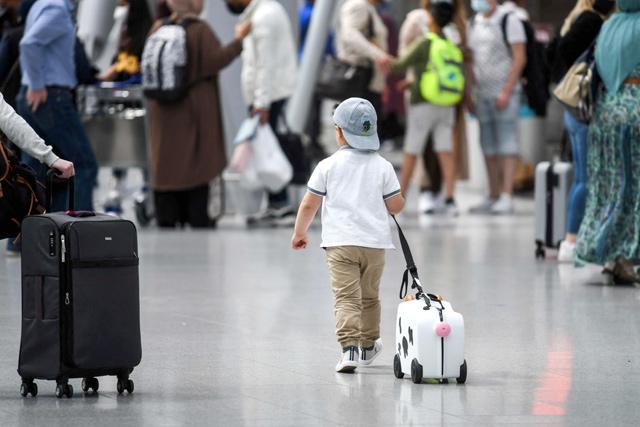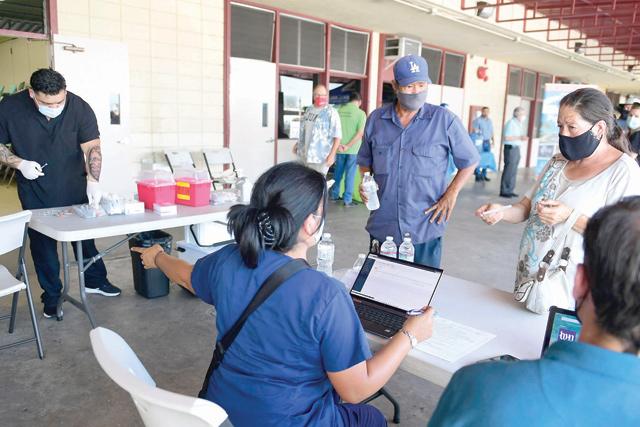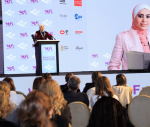You are here
Russia COVID deaths hit new record as EU eyes tourism reboot
By AFP - Jul 01,2021 - Last updated at Jul 01,2021

Medics escort a woman into a hospital where patients infected with the COVID-19 novel coronavirus are being treated in the settlement of Kommunarka outside Moscow on Wednesday. (AFP photo)
MOSCOW — Russia's COVID-19 death toll hit a new record Wednesday as the country battles the highly infectious Delta variant, while Europe geared up for the launch of an EU-wide COVID certificate to boost its devastated tourism industry.
Delta, the most contagious coronavirus variant identified to date, is fuelling concerns that the pandemic may be far from over after claiming nearly four million lives around the world.
Russia has reported 669 COVID deaths in the past 24 hours, a pandemic high for the second day in a row, according to government figures.
The new record comes two days before Saint Petersburg hosts a Euro 2020 quarter-final Friday in front of 26,000 spectators, many of them foreigners who have flown in for the match.
President Vladimir Putin pleaded with vaccine-sceptic Russians to get the shot, with only 15 per cent of the population inoculated so far even though free jabs have been available in the country since December.
"It is necessary to listen, not to people who understand little about this and spread rumours, but to specialists," Putin said.
He, nonetheless, said he did not support mandatory vaccinations, a policy brought in by Moscow and more than a dozen other regions for some workers in a bid to bring the infection rate down.
Australian anger grows
The Delta variant is fuelling multiple outbreaks in Australia, a country that had largely escaped the mass infections seen elsewhere — with the outback town of Alice Springs on Wednesday following Sydney, Brisbane and other cities into lockdown.
Anger is mounting among Australians over the country’s slow vaccine rollout, with only about 5 per cent jabbed so far after heavy reliance previously on border closures and strict hotel quarantines for overseas arrivals to curb the spread of the virus.
“It is disgraceful that the situation in Australia has essentially not changed in the last year,” locked-down Perth resident Robert Binczyk told AFP.
“The slow vaccine rollout from the federal government is to blame.”
Cases of the Delta variant, which was first detected in India, have been reported in at least 96 territories, according to the World Health Organisation.
Delta is expected to become the dominant variant in Europe in the coming months, but European Union authorities are banking on mass vaccinations to protect their populations from the high death tolls seen in earlier waves of the pandemic.
An EU-wide COVID travel certificate, showing passengers’ immunity status, comes into force on Thursday, fuelling hopes that Europe’s crucial tourism industry can slowly emerge from its worst period in living memory.
France, the world’s top tourist destination, on Wednesday ended most of its capacity limits on restaurants, cinemas, stores and other public venues, despite warnings of a likely fourth wave of cases in the autumn.
Francophile American tourists armed with vaccination certificates are now starting to return to Paris, to the relief of the hospitality sector.
“It’s amazing!” said Padmini Pyapali, an engineer on a tour of Greece and France with five friends.
“It’s just a rush of culture and we really missed it,” she said, enjoying a drink outside a cafe.
In Asia, tourism giant Thailand is also preparing to reopen the holiday hotspot of Phuket to vaccinated travellers to revive the battered tourism industry, even as the country registered 53 COVID deaths on Wednesday — its highest single-day death toll.
Globally, the economic impact from the plunge in tourism during the pandemic could top $4 trillion, according to a new UN report.
North Korean ‘incident’
In secretive North Korea, leader Kim Jong-un has replaced several senior officials after a “crucial” coronavirus incident, state media reported on Wednesday, potentially signalling a breach in the country’s epidemic defences.
Pyongyang closed its borders in January last year to try to protect itself against the virus that first emerged in neighbouring China.
It has not publicly confirmed any cases of COVID-19 at any point.
But analysts said the latest development was a clear indication there had been infections in North Korea, which would struggle with a major outbreak due to its ramshackle health system and lack of medical supplies.
North Korea is one of the five countries in the world that has yet to start immunising people against COVID-19, along with Burundi, Eritrea, Haiti and Tanzania.
Related Articles
BRUSSELS — An EU-wide COVID certificate for easier travel came into force on Thursday, just in time for Europe's busy summer vacation period
PARIS — Nations across the globe hit new pandemic highs and reimposed COVID-19 restrictions on Saturday as the highly contagious Delta varia
PARIS — A month after it was first detected in southern Africa, Omicron is now known to be far more contagious than previous variants of Co


















